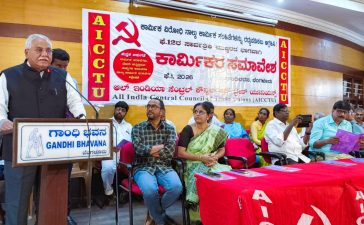“27,000 Acres of Waqf Land Allegedly Misappropriated in Karnataka, Valued at Rs 2 Lakh Crore: Zameer Ahmed Khan”
Karnataka Housing, Waqf, and Minority Welfare Minister B Z Zameer Ahmed Khan revealed that the state Waqf Board is dealing with widespread encroachments on its registered properties, with 4,108 cases filed across various districts. These encroachments involve mosques, dargahs, qabristans, ashurkhanas, idgahs, and other Waqf-related properties, many of which serve religious, educational, and social purposes.
During the ongoing budget session of the Karnataka Legislative Council, Khan presented data showing that out of the 4,108 cases, 1,935 (47%) have been disposed of so far. Additionally, 371 acres of encroached Waqf property have been reclaimed by the board.
Financial Support and Legal Challenges
Khan highlighted that Karnataka has 47,634 Waqf properties, with the state government providing annual grants totaling Rs 528 crore over the last five years. The grants included Rs 125 crore in 2019-20, Rs 87 crore in 2020-21, Rs 96 crore in 2021-22, Rs 93 crore in 2022-23, and Rs 127 crore in 2023-24.
Despite these efforts, the legal and administrative processes remain slow. Of the total encroachment cases, 2,173 are still pending with the Chief Executive Officer (CEO) or enquiry officer, while 76 cases are stuck in various courts.
Controversies and Farmer Protests
The Waqf Board’s claims have sparked controversy, particularly in cases involving farmers who have cultivated lands for generations. In October 2024, farmers in Honawad village, Vijayapura district, received eviction notices stating that 1,500 acres of their ancestral land had been declared Waqf property. This led to widespread protests.
The government later acknowledged the error, clarifying that only 11 acres belonged to the Waqf Board and assured the withdrawal of incorrect notices. In Vijayapura, 388 encroachment cases were filed, but only two have resulted in successful evictions. Similarly, in Gadag district, 315 farmers reclaimed their lands after legal battles, though only eight encroachment cases were filed, with no evictions taking place.
District-Wise Encroachment and Disposal Rates
Kalaburagi district has the highest number of encroachment cases at 562, followed by Bengaluru Urban (418), Vijayapura (388), Bidar (309), and Bellary (274). While Kalaburagi has resolved 394 out of 562 cases, Tumakuru has shown the highest disposal efficiency, resolving 242 out of 284 cases (85%). However, implementation remains a challenge in many areas.
Pending Cases and Tribunal Backlogs
The Karnataka Waqf Tribunal (KWT) is grappling with a significant backlog, with 112 cases currently pending. Districts like Vijayapura (224 cases), Tumakuru (221), and Bidar (91) have the highest tribunal involvement.
While 1,935 cases have been legally resolved, only 179 have seen actual execution. Additionally, 1,485 cases have been referred to Waqf officers for possession, but enforcement remains slow, particularly in Bengaluru Urban, Bidar, and Yadgir.
Historical Misappropriation Allegations
The reduction in Waqf land is largely attributed to encroachments and legal disputes. A 2012 report by the Karnataka State Minorities Commission alleged that around 27,000 acres of Waqf land, valued at Rs 2 lakh crore, had been misappropriated or illegally allocated, with involvement from politicians, board members, and real estate entities.
Quotes from the Minister
Minister Zameer Ahmed Khan stated, “The state government is committed to protecting Waqf properties and ensuring their rightful use. While progress has been made in resolving encroachment cases, there is still much work to be done to address the pending cases and enforce disposals effectively.”
As the Waqf Board continues its efforts to reclaim encroached properties, the legal and administrative challenges highlight the complexity of resolving such disputes in a timely manner.
Key Quotes of the Minister:
- Minister Zameer Ahmed Khan:
“The state government is committed to protecting Waqf properties and ensuring their rightful use. While progress has been made in resolving encroachment cases, there is still much work to be done to address the pending cases and enforce disposals effectively.” - Farmer from Vijayapura District:
“We have been cultivating this land for generations. Receiving eviction notices claiming it as Waqf property was shocking. We are relieved that the government acknowledged the error, but the process needs to be more transparent.” - Legal Expert on Waqf Disputes:
“The backlog of cases in the Waqf Tribunal and courts highlights the need for faster resolution mechanisms. Without timely action, the issue of encroachments will continue to escalate.”
Statements:
- From the Karnataka Government:
“The state has allocated Rs 528 crore over the last five years to support Waqf properties. We are working to resolve encroachment cases and ensure that these properties are used for their intended religious, educational, and social purposes.” - From the Karnataka Waqf Board:
“Out of 4,108 encroachment cases filed, 1,935 have been resolved, and 371 acres of land have been reclaimed. However, enforcement remains a challenge, and we are working to expedite the process.” - From the Karnataka State Minorities Commission (2012 Report):
“Approximately 27,000 acres of Waqf land, valued at Rs 2 lakh crore, have been misappropriated or illegally allocated. This calls for stricter oversight and accountability.”
Q & A:
Q: What is the scale of Waqf property encroachment in Karnataka?
A: As per Minister Zameer Ahmed Khan, 4,108 cases of encroachment have been filed across the state, with 1,935 cases resolved so far.
Q: How much Waqf land has been reclaimed?
A: The Waqf Board has reclaimed 371 acres of encroached land.
Q: What are the major challenges in resolving encroachment cases?
A: Legal complexities, slow administrative processes, and a backlog of cases in the Waqf Tribunal and courts are the primary challenges.
Q: How has the government supported Waqf properties financially?
A: The Karnataka government has provided Rs 528 crore in grants over the last five years to support Waqf properties.
Q: What sparked the recent controversy involving farmers?
A: In October 2024, farmers in Vijayapura district received eviction notices claiming 1,500 acres of their ancestral land as Waqf property. The government later clarified that only 11 acres were Waqf land and withdrew the incorrect notices.
Q: Which districts are most affected by encroachments?
A: Kalaburagi (562 cases), Bengaluru Urban (418), Vijayapura (388), Bidar (309), and Bellary (274) are among the worst-affected districts.
Short Summary of the Issue:
Karnataka is grappling with widespread encroachments on Waqf properties, with 4,108 cases filed across the state. While 1,935 cases have been resolved and 371 acres reclaimed, legal and administrative delays hinder progress. Controversies, such as the mistaken eviction notices to farmers in Vijayapura, highlight the need for transparency and faster resolution mechanisms. The state government has allocated Rs 528 crore over five years to support Waqf properties, but challenges remain in enforcing disposals and addressing misappropriation allegations.
![]()











